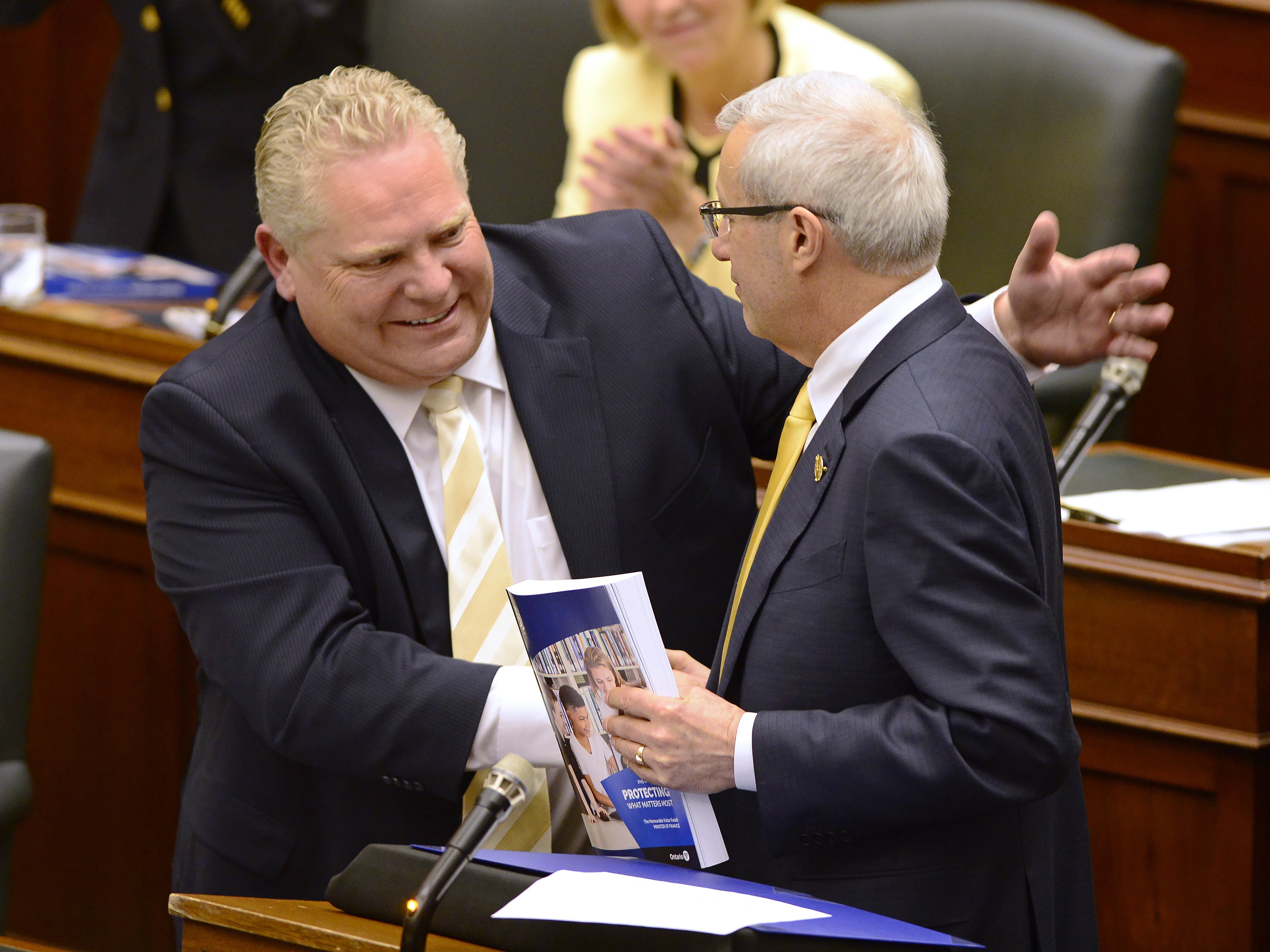Doug Ford’s Budget Is Big on Cuts and Making It Easier to Buy Booze

Credit to Author: Anne Gaviola| Date: Thu, 11 Apr 2019 21:59:12 +0000
Early boozy brunches, happy hours, day drinking in parks, and tailgating parties across Ontario are getting a big boost from Doug Ford’s first budget since he was handed a majority last year. Though some critics suggest that these are merely distractions from cuts to programs that help students, vulnerable children, and Indigenous people.
But first, the alcohol, and changes that were described by Finance Minister Vic Fedeli as “treating adults like adults.” You can start boozing at 9 AM with brunch, restaurants can advertise Happy Hour specials (that was restricted before), municipalities will be allowed to legalize consumption in public places such as parks and buying alcohol should be more convenient with plans to make it more widely-available in corner and grocery stores. Parking lots of major sports venues can get also special occasion liquor licenses on game days for proper American-style tailgating festivities.
Overall, it could have been worse. What Ontarians got wasn’t the big, bad austerity budget that opposition parties warned about. However, there are plenty of cuts, to services for Indigenous communities (whose funding is effectively halved), social services, and education.
Ford’s Progressive Conservative government is cutting $1 billion in funding for the Ministry of Children, Community and Social Services. Also getting chopped is about $750 million in funding for post-secondary education in this fiscal year alone. There are strings attached to getting money from the province too. Right now, about one percent of funding for universities and colleges is tied to things like graduation and employment and whether or not those outcomes align with the government’s priorities. Next year, 25 percent of funding will be dependent on outcomes, going up to 60 percent in five years.
The NDP describes this as, “Ford keeping universities and colleges under his thumb with a threat that as much as 60 percent of their remaining funding could be withheld,” according to a statement from NDP opposition leader Andrea Horwath. Her statement goes on to say that this was a fiscal plan that was nasty. “What we didn’t expect was the level of irresponsibility and outright cruelty we’re seeing in this budget,” she said.
On the subject of housing, which is a key issue for millennials, there is mention of boosting the housing supply action plan, but no detail in terms of funding and what that would be earmarked for—that information is set to be released in the coming weeks and months. Housing advocates say they’re reserving judgement on this plan when they actually know anything concrete.
Also MIA in this fiscal blueprint is the environment, according to Sean Lyons who is a professor of business and economics at the University of Guelph. “I think a lot of young people will be disappointed by the lack of attention to environmental issues in this budget. With the cancellation of cap and trade in Ontario, there is really no systematic plan to address climate change in Ontario and this budget doesn’t deliver anything on that front. The Ford Government has been quite vocal in their opposition of a federal carbon tax, but without a viable alternative.”
Ford fulfilled an election promise to help with child-care. Families making less than $150,000 can claim a tax credit for up to 75 percent of their child-minding costs. It’s a credit rather than a tax deduction so that people who don’t have an income can still get something from the government.
On the cannabis file, the budget outlines a pre-approval process to increase the number of retail locations that are allowed to sell weed once the supply chain opens up (beyond the 25 that have been given the green light).
We also got a look at projected cannabis revenue and it’s not great, regardless of whether you blame a national supply shortage or mismanagement. The provincial government estimates that the Ontario Cannabis Store will have operated at a net loss of $25 million for this fiscal year.
For many political pundits, the giant pink elephant in the room is what Ford plans to do about the deficit, which now sits at about $11.7 billion. He inherited a lot of debt (the largest in Canada) because every government in the province before him has run a deficit since 1989.
This Ontario budget says the books will be balanced in five years—after the next provincial election. This is, arguably, one of the most important things in terms of impact on young people because not having a strategy to tackle the deficit is like charging something on your credit card now and dealing with the bill for your purchase plus interest for later—and the longer you leave it, the more interest is charged, plus the interest rate goes up the more you owe. Right now, Ontario spends $12.5 billion a year on interest payments on its nearly $350-billion debt.
When it comes to balancing the province’s current needs with its future, John Fraser, the interim leader of the Ontario Liberal Party, says this budget falls short because, among other things, it doesn’t invest in young people. He wrote in a statement “Doug Ford has prioritized tailgating, beer and wine in corner stores and vanity licenses rather than investing in healthcare and education. Ontarians deserve so much better.”
Follow Anne on Twitter.